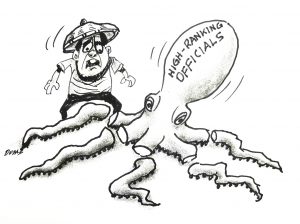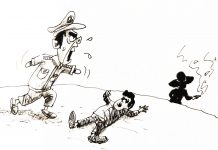Our country is no stranger to political discord and internal turmoil among its highest officials. We are witnessing a disturbing trend of bickering and infighting among top government officials, which has understandably raised concerns about the stability and effectiveness of the administration. The constant squabbling and power struggles among these officials have not only hindered the progress of important policy initiatives but have also undermined the public’s trust in the government.
One reason behind this bickering among top officials is the deep-rooted culture of political patronage and self-interest that pervades the country’s political landscape. Officials often prioritize their own personal agendas and interests over the greater good of the country, leading to conflicts and disagreements that can be detrimental to the overall governance of the nation. The intense competition for power and influence among the country’s political elite further fuels the animosity and discord among top government officials, as individuals jockey for position and control within the government.
The consequences of this bickering among our highest officials are far-reaching and damaging. Not only does it impede the government’s ability to effectively address pressing issues and challenges facing the country, but it also erodes public confidence in the government’s ability to govern. The constant display of disunity and discord among top officials sends a negative message to the public and creates an atmosphere of instability and uncertainty, which can ultimately undermine the country’s democratic institutions and processes.
The country’s political leaders should prioritize the national interest over personal ambitions and rivalries. Building a culture of cooperation, mutual respect, and consensus-building among them is essential for effective governance and ensuring the stability and prosperity of the nation. They need to set aside their differences and work together towards common goals so they can create a more cohesive and productive government that can better serve the needs and aspirations of the Filipino people.
Above all, they need to set good examples for their subordinates in government when it comes to public service. If they can’t work together in unity in the higher echelons of government, then how can we expect the workers in the lower branches of government to have the much-needed unity? Sometimes, you know, it’s a matter of cooperation that we need most so we can move forward as a developing nation. Without it, we’ll make no headway.




